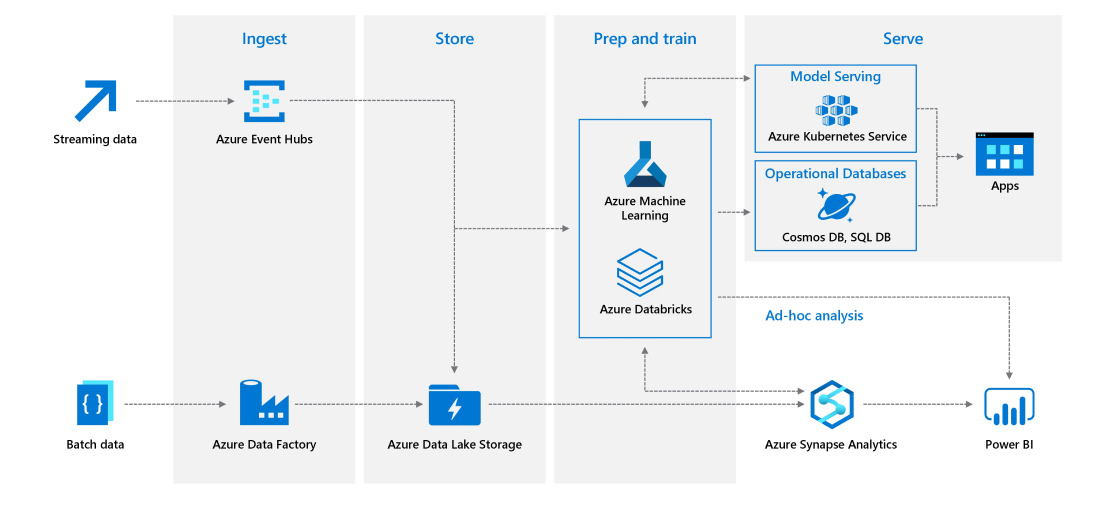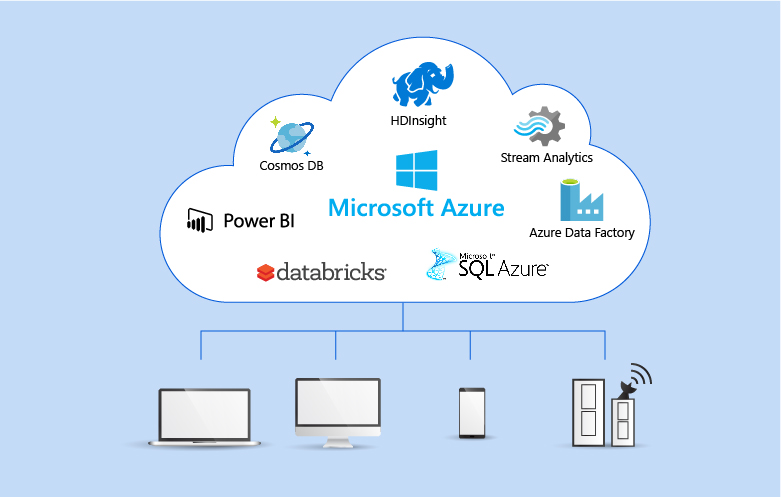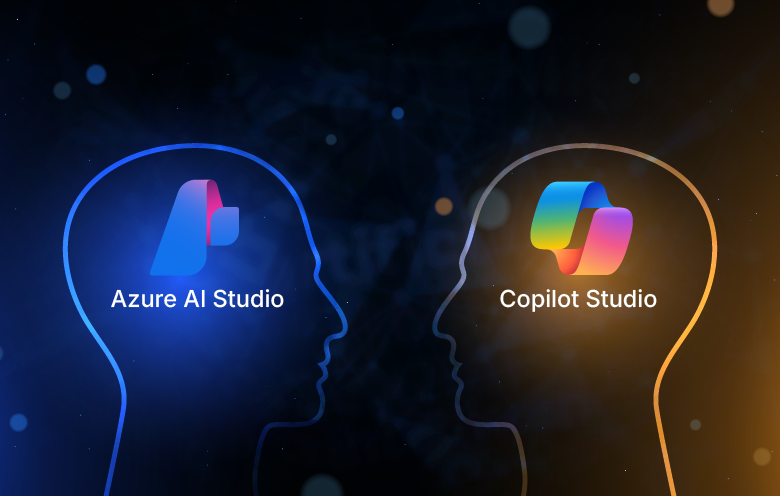Data is embedded in nearly every decision, process, and customer interaction. Yet, many organizations still struggle to translate that data into business value. The issue is rarely the absence of tools or technology, it’s the lack of a cohesive architecture that connects the right data to the right people at the right time.
Microsoft’s Azure modern data platform offers a foundation, bringing together a full spectrum of services for ingestion, storage, processing, governance, and visualization – on a flexible, scalable cloud foundation.
However, architecture alone is not enough. The key is in the ability in how anyone operationalizes that architecture – embeds intelligence across workflows, activates data at speed, and builds trust through governance and transparency.
In this blog post, we will walk through:
- The ten Azure services that power a modern data platform
- How each service addresses specific data and analytics needs
- Why this platform helps you work faster, smarter, and more securely
Whether you are a CIO looking to simplify your architecture, or a data leader seeking faster insights, this blog will help you understand how the Azure modern data platform fits into your strategy.
How different services from the Azure data platform can fulfill your data and analytics needs

1. Microsoft Power BI
Power BI is Microsoft’s cloud-based collaboration environment, utilized for sharing business intelligence (BI) content and dashboards with users. Since its launch, it has been picked up by numerous organizations with millions of users around the globe to create a data-driven culture. Connecting Power BI with Azure analytics can help you connect and analyze your entire data ecosystem. Power BI comprises of:
- Power BI mobile apps – To monitor the project’s progress
- Power BI desktop – To build dashboards and reports
- Power BI service – To view dashboards and reports
2. Azure Databricks
Azure Databricks is an Apache Spark-based analytics service, used for processing different types of data (mostly unstructured) along with batch processing, machine learning and data streaming. The unified cloud-based platform permits you to build an enterprise data platform with Azure and seamlessly integrate with open source libraries. Thus, it can help you to accelerate and streamline the data analytics process on massive datasets. Some of its key attributes are:
- Highly collaborative and scalable
- Supports multiple languages
- Streamlined, one-click rapid set-up
- Dynamically auto-scale up or down
- Secure data integration capabilities
3. Azure Synapse Analytics
Azure Synapse Analytics is an end-to-end solution combining big data and data warehousing into a unified experience. It allows us to ingest, explore, prepare, manage, and serve data for business intelligence and machine learning – all from a single interface.
Unlike traditional data warehouses, Synapse can work with structured and unstructured data. You can choose on-demand or provisioned queries, use SQL or Spark, and connect directly to Power BI and Azure machine learning – all within the same environment.
Notable features include:
- Unified workspace for SQL, Spark, and Data Explorer runtimes
- Seamless integration with Azure Data Lake and Data Factory
- Built-in security with role-based access control and data masking
- Real-time analytics over operational data
- Native connectors to Cosmos DB, Dataverse, and external sources
Whether you are building enterprise data warehouses or modernizing your analytics landscape, Azure Synapse helps break data silos, accelerate insights, and reduce time to value
4. Azure Cosmos DB
Azure Cosmos DB is a globally dispersed, NoSQL serverless database service platform from Microsoft. With this fully managed multi-model service, you can architect and govern redundant data across a myriad of Azure regions (at every place where your users reside) with a few clicks. In order to set up an Azure Cosmos DB platform and reap merits of its key features, you must have Azure subscription. The prominent features include:
- Low latency i.e. <10 ms while reading data and <15 ms while writing it
- 99% consistency, availability and throughput
- Access data utilizing APIs like JavaScript, MongoDB, SQL, etc.
- A comprehensive, ready-to-use database service
5. Azure Data Catalog
Do you need data consumption in a range of tools, but there is no way of sharing data artifacts across them? Or are you spending more time looking for data than analyzing it? Then, Azure Catalog is designed specifically for you to address such issues. It is an enterprise-wide metadata catalogue built-in Azure to enable power users (like data scientists, producers or analysts) with the self-service discovery of data from all sources. This makes the entire data asset discovery process quite simple and effortless. However, to enable Data Catalog, you should follow these five steps:
- Provisioning data catalog
- Register and annotate assets
- Discover assets
- Connect to the data
- Set-up security for data assets
6. Azure Data Factory
Azure Data Factory (ADF) is Azure’s cloud-based ETL (i.e. Extract, Transform and Load) service that enables power users to extract data from any source, transform them with the help of pipelines and then load the stack of organized data into third-party apps like Power BI to perform data analytics as well as visualization. This means it empowers enterprises to put in place data-driven workflows for automating and orchestrating data movement.
7. Azure Data Lake
Azure Data Lake is a data storage/file storage system that is highly scalable and is distributed in the cloud to store structured or unstructured data of all shapes, sizes and speed. It works within the existing IT infrastructure and can be seamlessly integrated with data warehouses, enabling you to extend your current data apps. Its principal characteristics include –
- Dynamic scaling
- Limitless Azure Blob storage
- Common data model (CDM) support
- Built on HDFS and YARN
- Multi-layer, enterprise-grade security
- Multiple access methods
8. Azure HDInsight
Azure HDInsight is a HADOOP and cloud-based Microsoft offering that gives enhanced open source big data analytics service to businesses. The service comprises of certain cluster types and customization capabilities like the potentiality to add components, plenty of languages and other utilities. HDInsight uses the Hortonworks Data Platform (HDP) configurations for creating clusters and it configures these clusters using multiple virtual machines.
9. Azure Stream Analytics
Azure Stream Analytics is an on-demand, real-time serverless analytics service that delivers rich, powerful insights to enterprises from their live streaming data. The data retrieved should be in a CSV, AVRO or JSON format while the output data i.e. the app logic can be programmed in any command language such as SQL in Azure Stream Analytics.
- Real-time analytics with Power BI
- No infrastructure set-up required
- Low TCO due to the pay-as-you-go model
- Increased programmer productivity
- Store streaming data over the cloud
10. Azure machine learning
Azure machine learning is a fully managed, enterprise-grade AI service that allows us to build and deploy business-critical ML models at scale.
With Azure machine learning, we can take advantage of key features for the full ML lifecycle, from data preparation on Apache Spark clusters to AI infrastructure which combines the latest GPUs and InfiniBand networking, and prompt flow to design language model workflows efficiently.
Key capabilities include:
- AutoML for quick model training and comparison
- Drag-and-drop designer for visual workflows
- MLOps for CI/CD integration and lifecycle management
- Integration with Azure Synapse, Databricks, and Power BI
- Model interpretability and responsible AI practices
Realize the potential of Microsoft Azure services
Data analytics help enterprises to uncover rich insights, improve efficiency, make smarter business moves and reduce operational costs. So, organizations are formalizing their way to the cloud and data-driven intelligence.
If you want to stay ahead of the pack and build a modern database warehouse to experience the power of the suite of Azure cloud services, get in touch with our team of experts and they will help you from consulting to transitioning to implementing immersive Azure data platform services.




